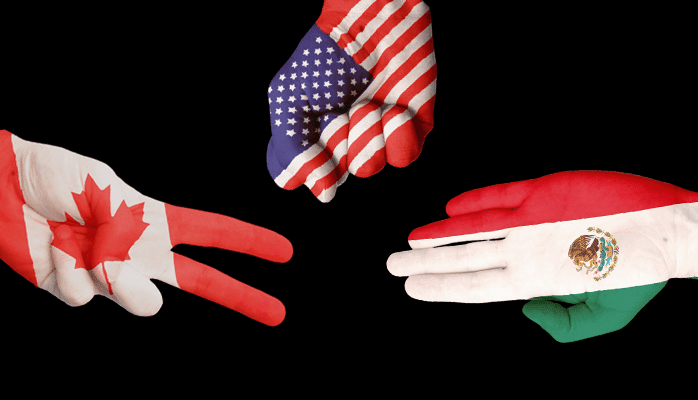Even before "populism" became the world's most fashionable adjective, Canada's political discourse was clearly moving in a direction of deference to the common man.
Talk of "taxpayers" is now ubiquitous when speaking of government spending. Health care reformists constantly profess the need to put "patients first." The tough-on-crime crowd calls for "victim-centric" justice. Recently-departed CRTC chairman Jean-Pierre Blais celebrated his tenure as "customer-centric." Even flying on an airline now guarantees you the protections of what Minister Garneau calls his government's "passenger's bill of rights."
Curious, then, that this focus on putting ordinary folks first has been so utterly lacking in our national conversation on NAFTA, which the Trudeau administration officially began renegotiating with President Trump's government this week.
On Monday, Foreign Minister Chrystia Freeland gave a brief speech on her trade priorities, which the press summarized as "10 demands." It was striking just how imperious and impersonal they were. The minister portrayed Canada-US trade as something extremely abstract and distant, something occurring between large economic actors — governments and corporations — that deserves to be described in their language, and biased to their interests.
Listening to Minister Freeland, what Canadians heard was a mostly technocratic speech full of sops to special interests (she vowed to "preserve Canadian culture and Canada's system of supply management"), corporate babble (visa reform for white collar workers is "increasingly critical to companies' ability to innovate across blended supply chains"), and ideological preening (there must be new NAFTA chapters on female equality, indigenous peoples, and climate change, she insisted). Absent was any concession, or even acknowledgement, of the trade priorities of ordinary Canadians.
It's a shame, because at its core, that's what international trade is truly all about. "America" and "Canada" are countries, and thus intangible concepts — they can't buy or sell things, except to the limited extent their governments can contract goods or services ("procurement liberalization" was, needless to say, brought up). The vast majority of North American trade occurs between Canadian customers and American businesses, or vice-versa. If an American company wants to make money in Canada, or a Canadian company wants to do the same in the States, at some point the people of the countries have to be involved. A company does not obtain riches in a new market simply because a government allows them to cross the border — just ask Target — but rather by selling goods or services the peoples in that market are interested in buying.
To the extent individuals come up in trade conversations, they're usually portrayed as victims — workers left behind as large corporations, concerned only with financial abstractions, relocate around the continent. Rarely are they cast in their more universally true role as the engine of the capitalist market system.
As Ottawa digs into NAFTA, a fresh way of thinking about North American trade would begin from the perspective of the individual Canadian consumer. What is the Canadian consumer's experience when he crosses the border to buy things? How has she found purchasing goods online from American stores? Do Canadians feel they have adequate access to American products they want? Can they obtain American goods in a prompt and hassle-free process? What about prices?
We know most of these answers already, of course. Cross-border shopping is easy but annoying, as Canada Border Services still busybodies the amount of US goods we can bring back, and when. Online shopping means dealing with endless warnings of "no shipment to Canada," stingy "de minimis" limitations, and extravagant mailing fees. Canadians want access to the latest and greatest American brands and products sooner and in more abundance, and would prefer to pay American-style prices for them, instead of infamous Canadian markups.
To be sure, those on the other side of the cashier deserve attention as well. I've previously written about the plight of the small businessmen who attempts to engage in cross-border sales, and the degree this class is burdened by appallingly insensitive trade rules that make even a few hours of selling goods in the other country almost impossible to do legally. Taking such concerns seriously would be another way of emphasizing a consumer-driven approach to trade, as it's small businessmen targeting small groups of customers, at trade shows, conventions, festivals, and fairs, with often highly experimental, innovative products, who have historically represented the most critical consumer-driven forms of capitalism. If one complaint of globalism is that consumers increasingly feel their purchasing options limited by the indifferent homogeneity of transnational mega corps, then surely an obvious balance would be making it easier for Canadian and American outsiders to enter, compete in, and dare I say disrupt existing continental markets.
Much like his presidency itself, President Trump's marquee proposal to renegotiate NAFTA has cycled quickly in the Ottawa hivemind from unimaginable, to intriguing, to something to be managed bureaucratically behind closed doors. Unlike the original proposal of free trade with the United States, which, as Minister Freeland openly conceded, convulsed this country in a polarizing debate on which every citizen had thoughts, it seems that NAFTA 2.0 will be a primarily out-of-sight tinker, driven mostly by the narrow priorities of those who have benefitted most from our existing free trade architecture, and expect it continue to in the future.
For large corporations dealing in huge cross-border shipments of natural resources or industrial products, that's probably good news. For the average Canadian hoping to see some observable change in the way he shops or sells, it's probably best not to get too excited.
Written by J.J. McCullough






